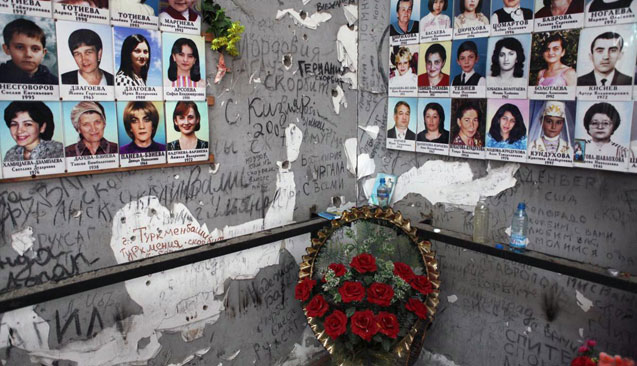
The memorial in the Secondary School in Beslan. Source: Robert Neu
Source: Robert Neu
The name Beslan will be forever linked to one of the absolute worst atrocities to ever be committed in human history.
Parched and weary, I enter Boris’ grocery store on Prospect Kosta — Vladikavkaz, capital of the Republic of North Ossetia. The suffocating heat does not help my appearance any; my shirt is filthy and soaked in sweat. A grey-haired man appears from the rear roam. It’s Boris. He lives in Beslan and will take me around the city.
We drive through the Ossetian steppe, leaving the lofty peaks of the Caucasus behind us. Boris invited me almost at once; his wife nodded her agreement to a matter already long since decided. I sit in a red Lada without a seat bench, the window agape.
We turn onto Boris’ street. Red brick walls conceal the city’s courtyards, summer kitchens, homes and gardens. Vines coil their way up to his living room window. The elderly mother takes me by the hand and thanks me for being her guest this day. “Sit down, eat.” She calls out to her daughter-in-law: “Feed our guest and your husband.”
The Ossetians have not changed their hospitable manner one bit since the act of terror in 2004. Boris pours me a shot. “We don’t want to get drunk, but tradition demands it.” He peels garlic, breaks bread and raises the glass.
A melody rings out — a hymn of praise dedicated to hospitality, to strangers whose presence brings riches into a home. Beyond dusty footprints, I have yet to leave anything behind. Moved, I soak up the heartfelt gesture and cringe when the firewater burns a bitter path down my throat. After three shots, tradition ceases with its demands.
“When I heard the first shots, when those terrorist pigs took our hopes, our future, our loved ones hostage, I grabbed my gun. My children were in the yard — may God watch over them. My children, my flesh and blood, my wife, my mother, they were all safe.”
Behind the brick wall and grapevines they stayed. Three days of lying low and avoiding the street. Chaos was everywhere. Armed men, soldiers and citizens were everywhere. Who was to say that there weren’t terrorists among them?
“Some got away.” That’s what they say. “The school was turned upside down by armed chaos. I didn’t know what was going on. I didn’t sleep, didn’t cry, didn’t eat, didn’t live for three days. I only stared into emptiness and took care of my family.”
Large wooden planks block the windows of Secondary School No. 1. We open an iron door and enter the courtyard. The guard is asleep in the shed. We wake him before slinking through the ruined gymnasium. There are stuffed animals in every corner, a large cross and bottles of water. For three days, there was no water. A basketball hoop poses as a grieving reminder.
Beslan seems well kept. We travel through the city on bike. The asphalt is new and the roofs solid. “That all comes from money received as compensation,” says Boris. But there is no price you can put on that kind of suffering. New plastic windows and a fence? A ludicrous tradeoff for children, parents, relatives and friends.
We drive past the new mosque and restored houses on our way to the graveyard. Children are screaming as they play ball on a brand new field that opens up in front of us. The most modern tennis courts south of Moscow are surely in Beslan. Floodlights illuminate everything: Perhaps they are trying to bring light to the city’s dark past.
“What do you consider normalcy?” I ask Boris. He caresses a tombstone. It could have easily been his kids. He ponders. The marble gravestones stretch out deep into the distance.
“We lost so much, but there is still a future for our children.”
Boris’ store has enabled him to send his eldest daughter to the university in St. Petersburg. “I went to the cemetery a hundred times, paying respects to friends and acquaintances. It will never be normal here. Every stone represents a hole in our hearts and in our souls.”
They have tried to fill all the holes, with asphalt in the streets, with a memorial over the gymnasium. They have built playing fields to shield against brooding, and floodlights against darkness. But the holes in the souls run deeper still. You can sense it in Beslan.
Boris takes me in like a father. He shares stories and thoughts with me, shares his time with me. His family did not lose anyone, but I can still see the deep hole lining his face.
All rights reserved by Rossiyskaya Gazeta.
Subscribe
to our newsletter!
Get the week's best stories straight to your inbox